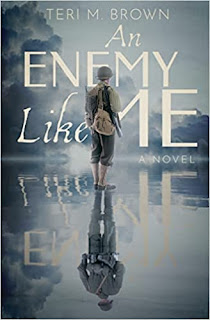Teri M. Brown is the author of the new novel An Enemy Like Me. She also has written the novel Sunflowers Beneath the Snow. She lives in North Carolina.
Q: What inspired you to write An Enemy Like Me, and how did you create your characters Jacob, Bonnie, and William?
A: The inspiration behind An Enemy Like Me is my family. We are of German heritage, though our family has been in the US since the 1700s. Nonetheless, when my grandfather fought in WWII and ended up in Germany, he had some angst about the situation. He once told me, “I always wondered if the person on the other end of my gun was a distant cousin.” This comment stuck with me and is what prompted this novel.
The characters Jacob and Bonnie are very loosely based on my grandfather, Robert Bufmeyer, and my grandmother, Yvonne. Their son, William, would be my father. Of course, I took great artistic license with these characters, so this is in no way a biography. Instead, Jacob, Bonnie, and William are a conglomerate of people I’ve known over the years, and each has a bit of me inside. I can’t imagine creating a character that didn’t contain a bit of myself.
Q: How did you research the novel, and did you learn anything that especially surprised you?
A: I love historical fiction because it gives me the chance to combine my love of writing and my love of research. My kids have teasingly called me Google Mom for years because when I hear a question, I immediately begin to search for the answer. Personally, I prefer the term #researchjunkie!
Most of my research for An Enemy Like Me was done via the Internet, though I have read hundreds of WWII novels and nonfiction books, as well as watched movies and documentaries. I would have loved to talk with WWII vets, but sadly, most are no longer with us.
The thing that surprised me most was the pro-Nazi Volksbund movement in the US and the backlash it created for German Americans. Most of us have heard about the internment camps for those of Japanese heritage living in the US, but few of us know that internment camps also existed for German Americans. Anyone of German descent found associating with pro-Nazi organizations were suspect and could be placed in a camp. Even those corresponding with relatives in Germany were put under a microscope.
Q: How was the book's title chosen, and what does it signify for you?
A: Jacob, a first-generation American, determines that the best way to prove his loyalty to the US was to join the Army and fight in the war. He figured he would be fighting the Japanese and that was an enemy he felt he could easily fight. However, his unit deployed to Germany, and he quickly realized he was far more like the enemy than he was different from them. Thus, An Enemy Like Me.
My hope is that those reading the book will look at this concept through the lens of modern-day xenophobia. I have found that if I’m open to the idea, I can find commonalities with most people I meet. Once we connect, the things that separate us – religious beliefs, political affiliations, race, gender, socio-economic status, sexual orientation, heritage – don’t matter.
I believe that the way to get rid of “isms” and “phobias” is by meeting people one-on-one. As we do this, it becomes more difficult to create an us vs. them mentality.
Q: Did you know how the novel would end before you started writing it, or did you make many changes along the way?
A: I did not know how it would end. My characters rarely give me insight into the end. Instead, I write what I hear them whispering until they finally reveal where we are headed. Once I wrote the first draft, I did make some changes, but they did not change the trajectory of the book. Instead, they were additions or subtractions that made the trajectory stronger.
Q: What are you working on now?
A: My current WIP (work in progress) is about a North Carolina Appalachian Mountain woman who is a healer in the 1890s. Like my other two novels (Sunflowers Beneath the Snow and An Enemy Like Me), it is generational so that we can look at events from various perspectives.
I’m excited about this novel because I hope to highlight some North Carolina folklore and healing traditions, the Cherokee culture, and what we, as humans, do when confronted with modern technology.
Q: Anything else we should know?
A: I really enjoy interacting with people who love books and writing. There are several ways to connect with me. The easiest is by going to my website (www.terimbrown.com). There, readers can sign up for my newsletter, contact me through my contact page, and follow all of my social media. If anyone has a question, comment, suggestion, or simply wants to chat, feel free to reach out!
--Interview with Deborah Kalb. Here's a previous Q&A with Teri M. Brown.


No comments:
Post a Comment